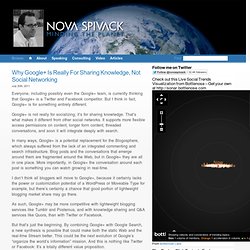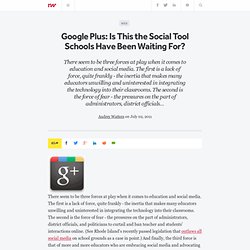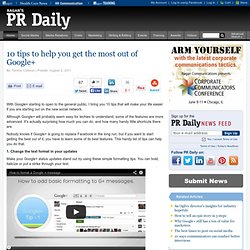

Why Google+ Is Really For Sharing Knowledge, Not Social Networking. Everyone, including possibly even the Google+ team, is currently thinking that Google+ is a Twitter and Facebook competitor.

But I think in fact, Google+ is for something entirely different. Google+ is not really for socializing; it’s for sharing knowledge. That’s what makes it different from other social networks. It supports more flexible access permissions on content, longer form content, threaded conversations, and soon it will integrate deeply with search. In many ways, Google+ is a potential replacement for the Blogosphere, which always suffered from the lack of an integrated commenting and search infrastructure.
I don’t think all bloggers will move to Google+, because it certainly lacks the power or customization potential of a WordPress or Moveable Type for example, but there’s certainly a chance that good portion of lightweight blogging market share may go there. But that’s just the beginning. Knowledge is not merely information, it is organized information. Google Plus: Is This the Social Tool Schools Have Been Waiting For? There seem to be three forces at play when it comes to education and social media.

The first is a lack of force, quite frankly - the inertia that makes many educators unwilling and uninterested in integrating the technology into their classrooms. The second is the force of fear - the pressures on the part of administrators, district officials, and politicians to curtail and ban teacher and students' interactions online. (See Rhode Island's recently passed legislation that outlaws all social media on school grounds as a case in point.) And finally, the third force is that of more and more educators who are embracing social media and advocating its use on- and off-campus - for student learning and for teacher professional development alike. I spent this past week with many of those teachers at the International Society for Technology in Education conference in Philadelphia, and when Google unveiled Google+ on Tuesday, most of us were otherwise preoccupied. Plus Potentials for Schools. 10 tips to help you get the most out of Google+ With Google+ starting to open to the general public, I bring you 10 tips that will make your life easier if you are starting out on the new social network.

Although Google+ will probably seem easy for techies to understand, some of the features are more advanced. It's actually surprising how much you can do, and how many handy little shortcuts there are. Nobody knows if Google+ is going to replace Facebook in the long run, but if you want to start getting the best out of it, you have to learn some of its best features. This handy list of tips can help you do that. 1. Make your Google+ status updates stand out by using these simple formatting tips. 2. Sparks is a nifty feature that helps you follow your interests. 3. Google+ makes it super easy to share photos and videos in your stream. 4. Google+ copied Twitter's wildly popular "@ reply" feature. 5. This is a little counter-intuitive, but Google+ allows you to send messages directly to one user. 6.
[Humour] Kit de survie : les 21 cercles Google+ à créer de toute urgence. Débuter sur Google plus, le nouveau réseau social de Google. Twitter et Facebook seraient-ils dangereusement infantilisants? La montée en puissance de Facebook, qui rassemble désormais 750 millions d’utilisateurs, suscite des inquiétudes de la part de psychanalystes et sociologues, qui s’inquiètent des conséquences psychologiques pour les adeptes les plus actifs.
Ainsi, certains ont pointé du doigt les dérives mythomanes de certains individus. Au Royaume Uni, c’est la Baronne Greenfield, professeur de pharmacologie à l’Université d’Oxford, qui vient de sonner l’alarme. Elle estime que la croissance d’amitiés virtuelles sur Facebook ou Twitter, ont la capacité de modifier le réseau neuronal du cerveau, et de mettre les utilisateurs en « crise d’identité ». « Ce qui m’inquiète le plus, c’est la banalité de ce qui circule sur Twitter. Pourquoi devrait-on s’intéresser à ce que quelqu’un d’autre a mangé à son petit déjeuner ?